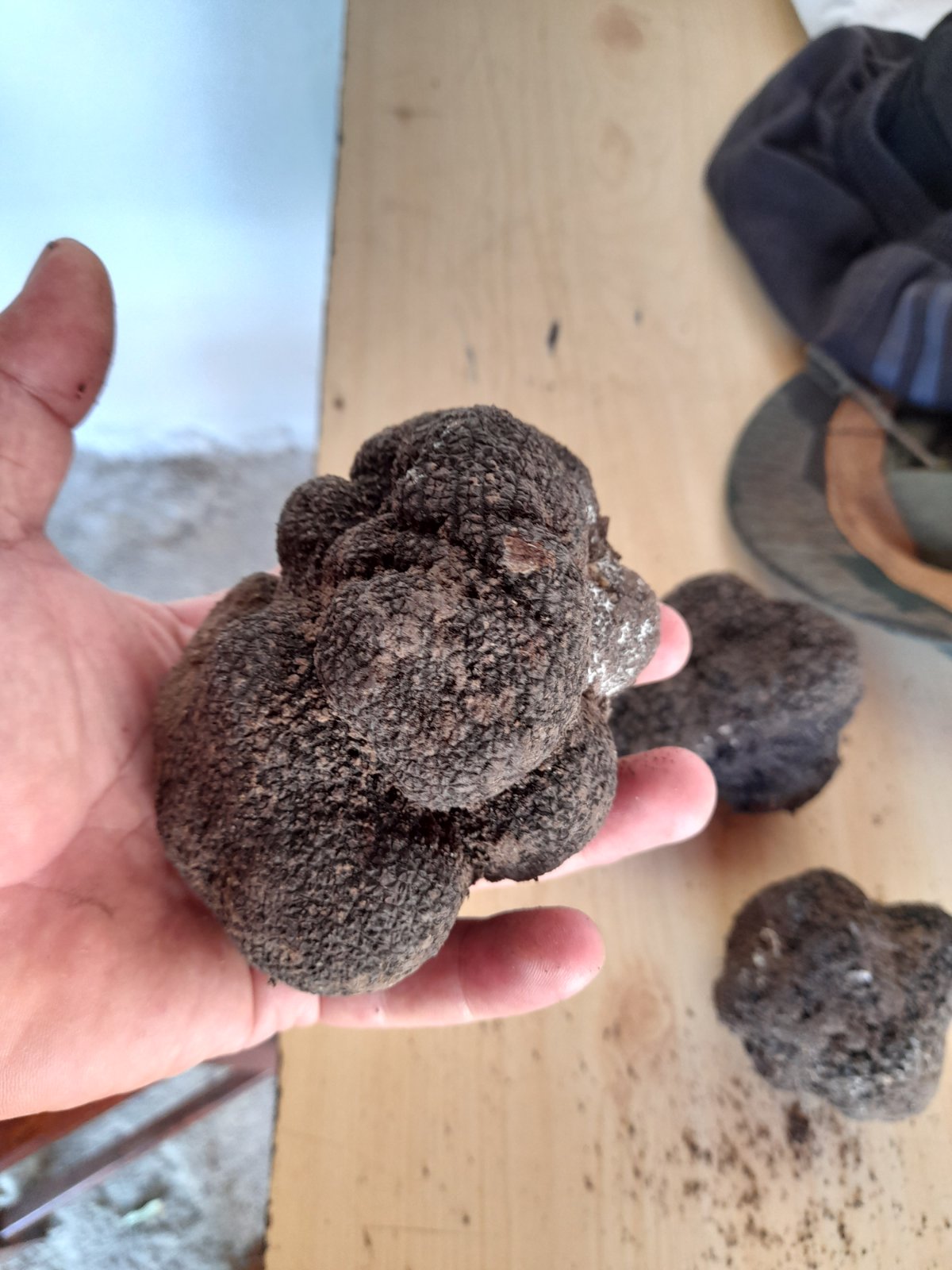The Black Winter Truffle, scientifically known as Tuber brumale, is a highly esteemed truffle species prized for its intense aroma and distinctive flavor. This truffle is also known as the “Muscat Truffle” due to its unique scent reminiscent of muscat wine. Here’s a detailed description of the Black Winter Truffle:
Physical Characteristics
Appearance
- Size and Shape: Black Winter Truffles typically range from the size of a marble to that of a golf ball. They are generally round or slightly irregular in shape, with a firm and dense structure.
- Exterior: The outer surface, or peridium, is dark brown to black and covered in small, polygonal warts that give it a rough texture. This characteristic warty surface is less pronounced than in some other black truffles.
- Interior: The flesh, or gleba, of the truffle is initially white but turns gray to dark brown as it matures. It is intricately marbled with fine white veins that create a beautiful contrast against the darker flesh.
Aroma and Flavor
- Aroma: Black Winter Truffles are known for their powerful, musky aroma, which is often described as a blend of earthy notes, spices, and muscat wine. This scent is more pungent and pronounced than other truffle varieties, making it a distinctive feature of Tuber brumale.
- Flavor: The flavor of Black Winter Truffles is robust and earthy, with a slight bitterness and a hint of spiciness. This complex flavor profile makes them a versatile ingredient that can enhance a variety of dishes.
Habitat and Harvesting
- Habitat: Black Winter Truffles grow symbiotically with the roots of certain trees, such as oaks, hazels, and pines. They thrive in calcareous soils that are well-drained and rich in organic matter.
- Geographical Distribution: Black Winter Truffles are predominantly found in Southern Europe, particularly in Italy, France, and Spain. They can also be found in parts of Eastern Europe.
- Season: The prime harvesting season for Black Winter Truffles is from November to March, aligning with the colder winter months. This late-season availability makes them a winter delicacy.
Culinary Uses
- Preparation: Due to their intense aroma and flavor, Black Winter Truffles are often used fresh, shaved thinly over dishes to maximize their impact. They can also be incorporated into sauces, pâtés, and truffle-infused products such as oils and butters.
- Pairings: Black Winter Truffles pair well with a wide range of ingredients, including pasta, risotto, eggs, and meat dishes. They complement rich, fatty foods such as foie gras, butter, and cream, as well as simpler dishes that allow their flavor to shine.
- Preservation: While best enjoyed fresh, Black Winter Truffles can be preserved through freezing, or by creating truffle butter or truffle oil. These methods help maintain their unique aroma and flavor over time.
Economic and Cultural Significance
- Economic Value: Black Winter Truffles are highly valued in the culinary world and can command significant prices, though they are generally less expensive than White Truffles and the more renowned Black Perigord Truffle. Their price reflects their rarity and the labor-intensive process of harvesting them.
- Cultural Importance: Truffle hunting is a revered tradition in many European regions, often involving specially trained dogs or pigs to locate the truffles underground. This practice highlights the cultural and historical significance of truffles in these areas, where festivals and markets often celebrate the truffle season.
Health Benefits
- Nutritional Content: Truffles are a good source of protein, fiber, and essential minerals such as iron, calcium, and magnesium. They also contain antioxidants that help reduce oxidative stress in the body.
- Potential Health Benefits: The antioxidants and anti-inflammatory properties of truffles may contribute to various health benefits, including improved digestion, enhanced immune function, and overall well-being.
Summary
Black Winter Truffles (Tuber brumale) are a highly prized ingredient in European cuisine, celebrated for their intense musky aroma and complex flavor profile. Their unique characteristics and seasonal availability make them a coveted delicacy among chefs and gourmands. Whether shaved over a simple dish or incorporated into more elaborate culinary creations, Black Winter Truffles add a luxurious and distinctive touch that elevates the dining experience.
